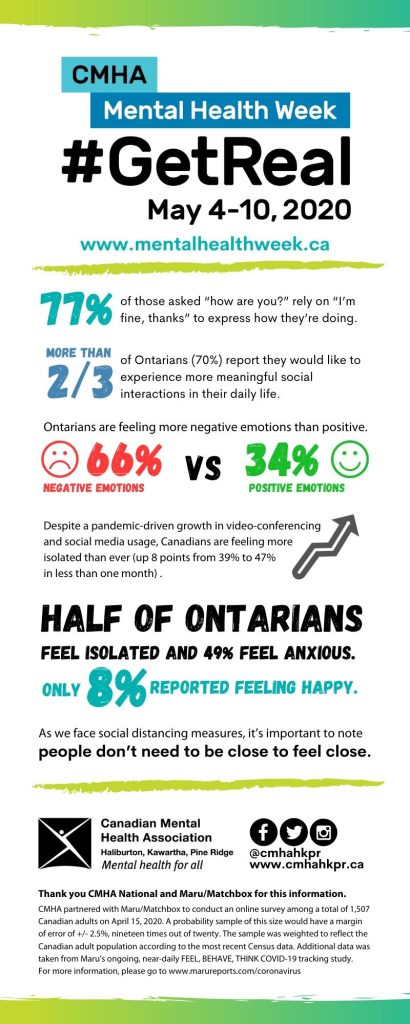Menu
Close
New data shows Ontarians feel isolated and crave social connection
May 4, 2020
Most Ontarians rely on shortcuts to describe their emotional state—even during the COVID-19 pandemic. According to new data released today by the Canadian Mental Health Association (C.M.H.A.) in partnership with Maru/Matchbox, 77 per cent of those asked “how are you?” rely on “I’m fine, thanks” to express how they’re doing, despite the fact that Ontarians are feeling more negative emotions than positive ones these days (66% negative vs. 34% positive). The information was released to mark Canada’s 69th annual Mental Health Week, which runs May 4-10, 2020.
Despite a pandemic-driven growth in video-conferencing and social media usage, Canadians are feeling more isolated than ever (up eight points from 39% to 47% in less than one month) and crave real, meaningful connections. In fact, more than two-thirds of Ontarians (70%) report they would like to experience more meaningful social interactions in their daily life.
“People want more social connection, we see the evidence in this new data, but they’re hesitant to have the honest conversations that could fulfill that need,” says Mark Graham, CEO of Canadian Mental Health Association, Haliburton, Kawartha, Pine Ridge (C.M.H.A. H.K.P.R.). “It’s become normal to ask people how they’re doing without expecting or providing a truthful answer. We all need to get real about our feelings. Now more than ever, we need this connection.”
 Prior to the global pandemic, loneliness was already a major public health concern. People with weak or few social connections are at increased risk for anxiety, depression, anti-social behaviour and suicide.1 And a lack of strong relationships has the same negative impact on life expectancy as smoking 15 cigarettes a day.2
Prior to the global pandemic, loneliness was already a major public health concern. People with weak or few social connections are at increased risk for anxiety, depression, anti-social behaviour and suicide.1 And a lack of strong relationships has the same negative impact on life expectancy as smoking 15 cigarettes a day.2
Due to physical distancing measures, people are isolated in their homes, missing out on family events and in-person activities and it appears they’re feeling it. Almost half of Ontarians are feeling anxious (49%), and only eight per cent are feeling happy. As we face social distancing measures, it’s important to note that people don’t need to be close to feel close.
“We know that social connection helps us feel close and connected to others, regardless of physical proximity. We also know isolation and loneliness can have a negative impact on mental health,” says Jack Veitch, Manager of Community Engagement and Education for C.M.H.A. H.K.P.R.
Strong social networks lead to better self-esteem, coping mechanisms and a sense of well-being, and reduce depression and distress by providing emotional support, companionship and opportunities for meaningful social engagement.3
The focus of this year’s Mental Health Week is to promote social connection and the role it plays in good mental health. To get involved, you can:
- Learn more about your mental health and how to feel close even when we can’t be at mentalhealthweek.ca/yourmentalhealth
- Share your support on social media by downloading a toolkit at mentalhealthweek.ca/toolkit and using hashtags #GetReal #MentalHealthWeek and #TogetherApart
- Go Green for Mental Health by wearing green, taking a selfie and sharing it on social media using #GoGreenforMH and tagging @cmhahkpr
- Donate to support C.M.H.A. H.K.P.R. mental health programs and services at cmhahkpr.ca/donate
- Connect. If you or someone you love is struggling, please contact us at www.cmhahkpr.ca, info@cmhahkpr.ca or 705-748-6711 to find out more about virtual and phone-based support services.
- If you are in crisis please call Four County Crisis at 705-745-6484 or toll-free 24/7 at 1-866-995-9933.
Mental Health Week was introduced by CMHA in 1951 and has since become a Canadian tradition. To learn more, please visit www.mentalhealthweek.ca
About the Data
CMHA partnered with Maru/Matchbox to conduct an online survey among a total of 1,507 Canadian adults on April 15, 2020. A probability sample of this size would have a margin of error of +/- 2.5%, nineteen times out of twenty. The sample was weighted to reflect the Canadian adult population according to the most recent Census data. Additional data was taken from Maru’s ongoing, near-daily FEEL, BEHAVE, THINK COVID-19 tracking study. For more information, please go to www.marureports.com/coronavirus
1 https://www.ncbi.nlm.nih.gov/pmc/articles/PMC2940247/
2 https://www.ncbi.nlm.nih.gov/pmc/articles/PMC3890922/
3 https://www.ncbi.nlm.nih.gov/pmc/articles/PMC3455910/pdf/11524_2006_Article_44.pdf